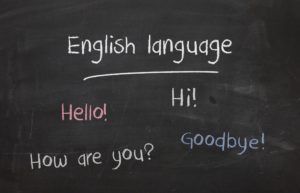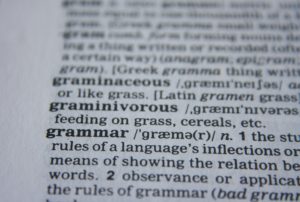Gladys Hunt reflects on the importance of grammar, plain and simple, in this essay. It’s not as hard as you might think! This is the next in our series of blogposts by the author of Honey For a Child’s Heart.
“Grammar Does Matter” by Gladys Hunt
Every family has its own way of speaking. It’s partly the result of the community we live in, and our extended family. Families have their own language. Different parts of the country have habits of expression. It’s likely that you use some of the same phrases your mother or other family members used. One of my southern friends told me a story involving her sister and added at the end, “You know, she is great-with-child.” She spoke those last three words as one adjective describing her sister. I had to stop and figure out that the sister was pregnant!
We call the people who live in the upper peninsula of Michigan Yoopers, and they are often identified because they say “youse” as a plural you. Think of your own family and geographical location and come up with other examples. It might be fun to list them. One has to be careful, however. I heard a Yooper auctioneer ask the crowd to “quieten down.” That’s kind of a humorous, delicious expression, I thought. And then I looked it up in the dictionary and found it a legitimate word:
Quieten: to become quiet.
The more serious idiosyncrasies are usually grammatical—and these are the subject of this blog. Grammar does matter. You can send a child into the world thinking that “him and me” are legitimate subjects of a sentence and never realize what a handicap you have given that child. Let a child say, “Her and I” will walk to school together? No. No. No. Thrice no. It’s like wearing a negative label each time such an utterance hits the sound waves. The strange thing is that university graduates talk like this, so it is not lack of education. It’s habit, and it’s thoughtless habit. You grew up hearing people talk this way, but it is jarring to the ear—and certainly puts a roadblock in the path to success.

Sentences have subjects (nouns or pronouns) usually followed by a verb which is followed by the direct object of the verb. Him, me, and her are direct objects of a verb. Your ear tells you. I is a pronoun, the subject of the sentence. You would never say Her go to school. But you can say I go to school. The trouble comes with combining a pronoun and an object as the subject of the sentence. It is she and I go to school, not her and I. When in doubt, try one subject-choice alone with the verb. Your ear will tell you.
The most common error (even among news commentators) is to make I the direct object of a verb. “He would not go with you and I.” Try it out. You would not say “He would not go with I.” No, it sounds ridiculous. Because I is not a direct object. Instead , say, “He would not go with you and me.” It is most often misused in sentences like this, “It is plain to you and I….” It doesn’t sound wrong at first, but what if you took out the words you and? You wouldn’t say “It is plain to I…” The correct sentence reads, “It is plain to you and me!”
You may be thinking, Who cares? Well, YOU care. It’s a matter of breaking the habit and being conscious of a dreadful habit of making direct objects into the subject of sentences. Gentle does it in correcting children. Usually they don’t repeat what they haven’t ever heard!
Gladys Hunt wrote these blog posts for Tumblon.com, a web app that helped parents understand children’s development. Graham Scharf, one of the co-founders of Tumblon, has granted permission for these posts to be published here to achieve Gladys’s aim: for children and their parents to explore and enjoy great books together.
For more at RedeemedReader, see our review of Wordsmith, Janie’s writing curriculum for middle grade students (and high school students!). Janie also shares some teaching ideas in her post, Laid Back Grammar. The subject doesn’t have to be boring or onerous! In addition, check out the two grammar guides listed below. Humorous, they are helpful even for the seasoned English teacher. Our English language can be a pesky thing to corral on occasion.
Please note: all affiliate links benefit Redeemed Reader and help us continue to offer opportunities like this!
Support our writers and help keep Redeemed Reader ad-free by joining the Redeemed Reader Fellowship.
Stay Up to Date!
Get the information you need to make wise choices about books for your children and teens.
Our weekly newsletter includes our latest reviews, related links from around the web, a featured book list, book trivia, and more. We never sell your information. You may unsubscribe at any time.
We'd love to hear from you!
Our comments are now limited to our members (both Silver and Golden Key). Members, you just need to log in with your normal log-in credentials!
Not a member yet? You can join the Silver Key ($2.99/month) for a free 2-week trial. Cancel at any time. Find out more about membership here.


